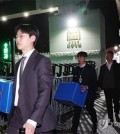- California Assembly OKs highest minimum wage in nation
- S. Korea unveils first graphic cigarette warnings
- US joins with South Korea, Japan in bid to deter North Korea
- LPGA golfer Chun In-gee finally back in action
- S. Korea won’t be top seed in final World Cup qualification round
- US men’s soccer misses 2nd straight Olympics
- US back on track in qualifying with 4-0 win over Guatemala
- High-intensity workout injuries spawn cottage industry
- CDC expands range of Zika mosquitoes into parts of Northeast
- Who knew? ‘The Walking Dead’ is helping families connect
S. Korea faces dilemma of whether to bring back US nuclear weapons: Expert
WASHINGTON (Yonhap) — South Korea will face a strategic choice of whether it should seek to bring U.S. nuclear weapons back into the country, pursue its own nuclear armament or accept a nuclear North Korea if Pyongyang’s nuclear threat reaches a serious level, a U.S. expert said Tuesday.
That situation, in turn, would force a strategic choice upon the United States as well, namely whether to forward deploy nuclear weapons on the territory of its non-nuclear allies, said Clark Murdock, a senior adviser with the International Security Program at the Center for Strategic and International Studies.
“North Korea’s fourth nuclear test challenges again the U.S. extended nuclear deterrence to South Korea,” Murdock said in an email to Yonhap News Agency. “If, or perhaps ‘once,’ North Korea achieves that level of nuclear capability, the credibility of the U.S.’ nuclear umbrella in Northeast Asia will be directly tested.”
After the North’s fourth nuclear test last week, some members of South Korea’s ruling party called for deployment of nuclear weapons in the country. But the government dismissed the idea, saying it runs counter to the principle of a nuclear-free Korean Peninsula.
“If the nuclear threat posed by North Korea … should reach that level of seriousness, South Korea … will face a critical strategic choice: seek the re-introduction of U.S. nuclear weapons, pursue its own independent nuclear force or accept the necessity of accommodating its nuclear-armed adversaries, often-called ‘Finlandization,’” Murdock said.














![넷플릭스 2025년 라인업 공개 [넷플릭스 제공. 재판매 및 DB 금지]](http://www.koreatimesus.com/wp-content/uploads/2025/04/20250415135202671-copy-120x134.jpg)
